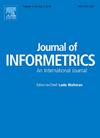Unfinished grants, unending progress: The impact of unfinished research grants on scientific innovation
IF 3.5
2区 管理学
Q2 COMPUTER SCIENCE, INTERDISCIPLINARY APPLICATIONS
引用次数: 0
Abstract
Scientists may not fulfill the objectives delineated within their research proposals subsequent to the receipt of funding. The extent to which unfinished grants enhance scientific knowledge remains an open question. Drawing upon a dataset from the Research Grants Council of Hong Kong (RGC) that encompasses the years 2010 to 2020, and is distinguished by its inclusion of self-reported grant completion rates, this study seeks to assess the potential contributions of research grants that were not fully completed to the progress of scientific knowledge. The analysis is conducted by leveraging the RGC's detailed records of project completion rates. The results indicate that, notwithstanding a relative lack in productivity and impact, there is no evidence that unfinished grants generate knowledge that is less disruptive than that produced by completed grants. Consequently, it is suggested that funding bodies should consider revising their assessment criteria to recognize the intrinsic merit of grants that are traditionally labeled as unfinished, thus providing more flexibility for the exploration of novel research domains within the grant allocation process.
未完成的资助,永无止境的进步:未完成的研究资助对科学创新的影响
在收到资助后,科学家可能无法完成其研究计划中所描述的目标。未完成的拨款能在多大程度上增进科学知识,这仍是一个悬而未决的问题。根据香港研究资助局(研资局)2010年至2020年的数据集,本研究旨在评估尚未完全完成的研究资助对科学知识进步的潜在贡献,其特点是纳入了自我报告的资助完成率。这项分析是根据研资局有关项目完成率的详细记录进行的。结果表明,尽管生产力和影响相对缺乏,但没有证据表明未完成的资助产生的知识比完成的资助产生的知识更具破坏性。因此,建议资助机构应考虑修改其评估标准,以认识到传统上被标记为未完成的资助的内在价值,从而在资助分配过程中为探索新的研究领域提供更大的灵活性。
本文章由计算机程序翻译,如有差异,请以英文原文为准。
求助全文
约1分钟内获得全文
求助全文
来源期刊

Journal of Informetrics
Social Sciences-Library and Information Sciences
CiteScore
6.40
自引率
16.20%
发文量
95
期刊介绍:
Journal of Informetrics (JOI) publishes rigorous high-quality research on quantitative aspects of information science. The main focus of the journal is on topics in bibliometrics, scientometrics, webometrics, patentometrics, altmetrics and research evaluation. Contributions studying informetric problems using methods from other quantitative fields, such as mathematics, statistics, computer science, economics and econometrics, and network science, are especially encouraged. JOI publishes both theoretical and empirical work. In general, case studies, for instance a bibliometric analysis focusing on a specific research field or a specific country, are not considered suitable for publication in JOI, unless they contain innovative methodological elements.
 求助内容:
求助内容: 应助结果提醒方式:
应助结果提醒方式:


